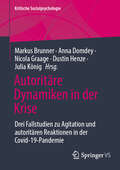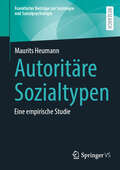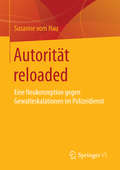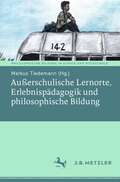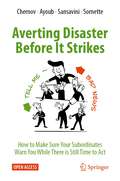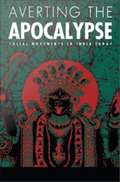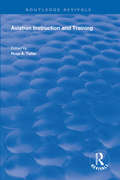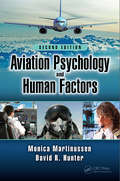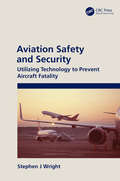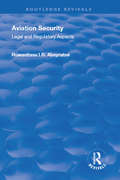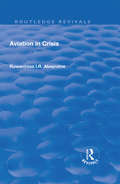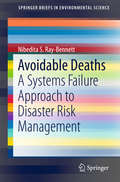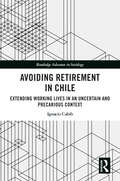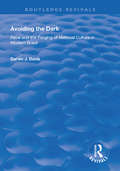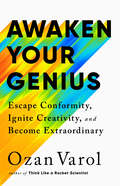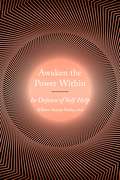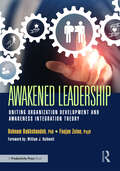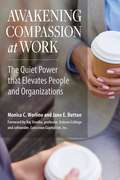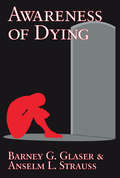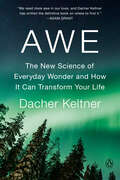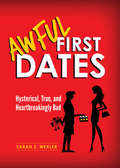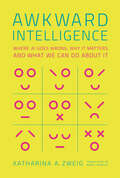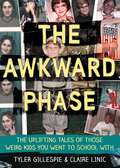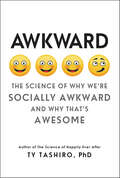- Table View
- List View
Autoritäre Dynamiken in der Krise: Drei Fallstudien zu Agitation und autoritären Reaktionen in der Covid-19-Pandemie (Kritische Sozialpsychologie)
by Julia König Markus Brunner Anna Domdey Nicola Graage Dustin HenzeAls eine globale Krise hatte die Covid-19-Pandemie nicht nur gesundheitliche und wirtschaftliche Folgen, sondern löste auch politische und gesellschaftliche Veränderungen aus. Wie reagierten die Menschen hierauf und welche autoritären Dynamiken wurden dabei sichtbar? Aus einer psychoanalytisch-sozialpsychologischen Forschungsperspektive und in Anknüpfung an die Autoritarismusforschung der Kritischen Theorie untersuchen drei empirische Fallstudien - über Videos der Querdenker-Szene, Bundestagsreden der AfD sowie biografische Interviews - unterschiedliche Facetten autoritärer Agitation und Reaktion auf die Pandemie. Die Ergebnisse veranschaulichen, wie die Pandemie als ein Brennglas für gesellschaftliche Widersprüche und Konflikte wirkt, die sich subjektiv niederschlagen und durch verschwörungsideologische und rechtspopulistische Akteur:innen propagandistisch bedient werden. Die Erkenntnisse verweisen dabei auch auf mögliche Herausforderungen künftiger Krisen.
Autoritäre Sozialtypen: Eine empirische Studie (Frankfurter Beiträge zur Soziologie und Sozialpsychologie)
by Maurits HeumannWährend in der Öffentlichkeit intensiv darüber diskutiert wird, ob man ‚mit Rechten reden‘ sollte, geht dieses Buch einen Schritt weiter und untersucht die Perspektiven jener, die sich von solchen Debatten persönlich angegriffen fühlen. Basierend auf der Tradition der Frankfurter Autoritarismusforschung analysiert die Studie die ideologischen Spannungsfelder innerhalb der deutschen Gesellschaft und liefert wertvolle Einblicke in die widersprüchlichen politischen Positionen und biografischen Hintergründe der Befragten. Im Zentrum der Analyse stehen zwei identifizierte Sozialtypen des ‚neuen‘ Autoritarismus: die autoritären Innovator*innen und die regressiven Rebell*innen. Während erstere in stabilen sozialen Verhältnissen leben, sehen sich letztere zunehmend prekären Lebensumständen ausgesetzt. Entscheidend ist jedoch nicht allein die aktuelle soziale Lage, sondern vielmehr die individuelle Lebensgeschichte und der persönliche Werdegang. Die Analyse zeigt, dass individuelle Lebenswege eng mit ideologischen Reaktionsmustern verknüpft sind. Mit der Typologie leistet das Buch einen Beitrag für ein detaillierteres Verständnis der vielfältigen autoritären Phänomene unserer Zeit und der zugrunde liegenden sozialen Dynamiken.
Autorität reloaded: Eine Neukonzeption gegen Gewalteskalationen im Polizeidienst
by Susanne Vom HauAutorität ist das Thema dieses Buches. Eskalationen im Polizeidienst, die offenbar im Zuge der Individualisierung eine neue Qualität erreicht haben, erfordern ein Umdenken der Polizei. Das betrifft besonders das antiquierte Autoritätsverständnis der Polizei. Wie aber lässt sich in der offenen Gesellschaft, in der Über- bzw. Unterordnungsverhältnisse als voraufklärerisch gelten, ein Autoritätsanspruch der Polizei aufrechterhalten? Mit dem Ziel, die funktionale Ausrichtung der Polizei in der Gesellschaft den Befindlichkeiten des selbstbestimmten Bürgers im 21. Jahrhundert anzupassen, wird eine Neukonzeption von Polizeiautorität vorgelegt.
Außerschulische Lernorte, Erlebnispädagogik und philosophische Bildung (Philosophische Bildung in Schule und Hochschule)
by Markus TiedemannDie Fachdidaktik der Philosophie und Ethik fordert Problemorientierung und Lebensweltbezug. Exkursionen, außerschulische Lernorte oder ‚Outdoor Education‘ haben allerdings bisher kaum Berücksichtigung in der fachdidaktischen Forschung erfahren. Eine systematische Auslotung von möglichen Kooperationen, Synergieeffekten oder Unvereinbarkeiten wurde bisher nicht geleistet. Der vorliegende Band versucht diese Lücke zu schließen und eine erste Grundlage für weiterführende Forschungen, Erprobungen und Diskussionen zu schaffen. Er soll damit sowohl einen Beitrag zur Lehrerausbildung an Universitäten und Studienseminaren als auch für die fachdidaktische Explorationsforschung leisten.
Averting Disaster Before It Strikes: How to Make Sure Your Subordinates Warn You While There is Still Time to Act
by Didier Sornette Dmitry Chernov Ali Ayoub Giovanni SansaviniSome of the major industrial disasters could have been prevented. When the facts of what happened are established, their stories share a common thread: before things spiralled out of control, there were workers at the affected sites who knew that the situation was dangerous, and could become catastrophic unless immediate action was taken. But tragically, nobody dared to tell the decision-makers who could have authorized that action. With no idea of the risks they were taking, the people in charge continued as normal… and disaster struck. Because vital information about risks could not flow freely from the shop floor to the director’s office, the crucial decisions were not made in time. This observation has been documented in the following major technological accidents: Challenger space shuttle explosion (USA, 1986); Chernobyl nuclear plant disaster (USSR, 1986); Deepwater Horizon oil spill (USA, 2010); Fukushima-1 nuclear power plant disaster (Japan, 2011); and numerous other industrial disasters. After accidents like these, losses and costs for dealing with the consequences are often hundreds — or even thousands — of times greater than the finances that would have been required to deal with the risks when they were first recognized.This handbook is about how to transform the way large critical infrastructure companies communicate about safety and technological risks. It aims to support senior managers to get the information they need from their subordinates concerning the risks they are facing, in order to prevent accidents before it is too late.The recommendations in this handbook are based on interviews with 100 executives at various levels, working in 65 critical infrastructure companies around the world, in power, oil and gas, metals, chemicals and petrochemicals, mining and other industries.The recommendations of these leaders were also tested in the pilot project, in an industrial company which is the world leader in its sector. More than 400 managers at various levels of the corporate hierarchy, and employees at several of the company’s industrial plants, took part in the project.This open access handbook is written for the owners, senior managers, and industrial safety directors of critical infrastructure companies.
Averting the Apocalypse: Social Movements in India Today
by Arthur BonnerThere are two Indias: the caste and class elite who hold all power and make up 10 to 15 percent of the population, and everyone else. Averting the Apocalypse is about everyone else. Arthur Bonner, a former New York Times reporter with long experience as a foreign correspondent in Asia, conducted interviews over many months while traveling almost 20,000 miles within India seeking out the underclass and social activists who together are beginning to mobilize for social change at the bottom of Indian society. Working in areas torn by violence, Bonner offers a terrifyingly accurate portrait of a society bloodied by decades of unequal social structure and the absence of a civil society and political mechanism capable of responding to the exploitation of the poor and weak. Bonner finds that India's inability or refusal to address its debilitating social structure may be the precursor to an apocalyptic social upheaval unless heed is paid to the social movements that his first-hand investigation reveals.
Aviation Instruction and Training (Routledge Revivals)
by Ross A. TelferFirst published in 1993. In both general aviation and airline transport there is evidence of an emergent awareness of the importance of instruction in training. The demands of technological change, growing need for pilots at a time when the pool of experienced applicants is diminishing, and growing recognition of the importance of Human Factors to aviation safety, are straining the ability to cope. There is a growing recognition by management, of the contribution of ground and airborne instruction to the efficient operation of aviation in a variety of contexts. This book shows how professionals in the aviation industry and academic researchers complement each other in their pursuit of more effective and efficient flight training and instruction. Theory and practice each have a contribution to make. The contributions are thus drawn from regulatory authorities, airlines, universities, colleges, flying schools, the armed services and private practice. Such a mix brings differences in approach, style and argument showing both the variety and common aims in the emerging profession of flight instruction.
Aviation Psychology and Human Factors
by Monica Martinussen David R. HunterThis book covers the application of psychological principles and techniques to situations and problems of aviation. It offers an overview of the role psychology plays in aviation, system design, selection and training of pilots, characteristics of pilots, safety, and passenger behavior. It covers concepts of psychological research and data analysis and shows how these tools are used in the development of new psychological knowledge. The new edition offers material on physiological effects on pilot performance, a new chapter on aviation physiology, more material on fatigue, safety culture, mental health and safety, as well as practical examples and exercises after each chapter.
Aviation Safety and Security: Utilizing Technology to Prevent Aircraft Fatality
by Stephen J WrightThis book focuses on ways to better manage and prevent aircraft-based homicide events while in flight using alternate technology to replace the Cockpit Voice Recorder (CVR) and/or Digital Flight Data Recorder (DFDR) functions. While these events are infrequent, the implementation of real-time predictive maintenance allows aircraft operators to better manage both scheduled and unscheduled maintenance events. Aviation Safety and Security: Utilizing Technology to Prevent Aircraft Fatality explores historical events of in-flight homicide and includes relevant accident case study excerpts from the National Transportation Safety Board (NTSB) and Air Accidents Investigation Branch (AAIB). FEATURES Explores historical events of in-flight homicide and offers solutions for ways to mitigate risk Explains how alternate technologies can be implemented to address in-flight safety issues Demonstrates that metrics for change are not solely for safety but also for financial savings for aircraft operation Includes relevant accident case study excerpts from the NTSB and AAIB Expresses the need for real-time predictive maintenance Stephen J Wright is an academic Professor at the faculty of Engineering and Natural Sciences at Tampere University, Finland, specializing in aviation, aeronautical engineering, and aircraft systems.
Aviation Security: Legal and Regulatory Aspects (Routledge Revivals)
by Ruwantissa I.R. AbeyratnePublished in 1998. The various conventions which apply to the subject of unlawful interface with civil aviation have proved effective only to the extent of nurturing existing values of international law as they are restrictively perceived through the parameters of air law. This book examines the offence of unlawful interference with international civil aviation and analyses critically the legal and regulatory regime that applies thereto, with a view to recommending measures that are calculated to infuse a new approach to the problem. Emphasis is laid throughout the work on action which may be taken to alleviate the problem of unlawful interference. Its conclusion incorporates various steps that can be taken towards achieving this objective. The author focuses on the core of the problem which has effectively precluded significant progress into inroads that would curb the threat terrorism in aviation: the attitude of the international community. The book therefore examines in limine the fundamental role of international law in the light of the United Nationals Congress of International Public Law of March 1995, and its effect on international criminal law. It then determines the applicable principles of State sovereignty and examines the principles of State responsibility. Its main purpose is to recommend the establishment of a new philosophy of international criminal law which transcends municipal boundaries. Academic, scholarly and judicial precedent for this book is the adduced in support of this argument. The book also examines the role of International Civil Aviation Organization (ICAO) as the regulatory body responsible for civil aviation, in the context of new approaches made by the international community towards the status of ICAO in aviation security. The practical value of this work essentially lies in the legal recommendations it makes at its conclusion, which are based on existing principles of international law. It will thus be invaluable not only to international and aviation lawyers, criminal lawyers (both international and national), security professionals and teachers and students of international law, but also to aviation industry executives and regulatory agency specialists whose responsibilities impinge on or are determined by existing and evolving legal and security measures.
Aviation in Crisis
by Ruwantissa AbeyratneThis title was first published in 2003. The events of 11 September 2001 defy modern economic theory when addressed in aviation terms. Economic theory would suggest that, once the impact of such events are a thing of the past, and economies are restored to their status quo ante, a rise in the gross domestic product of States to earlier levels would almost inevitably result in increased consumption. This in turn would mean that the demand for air travel would rise to earlier proportions and consumption in terms of air transport services would be restored to normalcy. However, the September attacks on United States' property introduced a unique characteristic through the fear factor that directly impacts the future development of air transport. As a result, the grim task of restoration of passenger confidence stands in the way of economic revival of the air transport industry. Aviation was always in crisis. The air transport industry, even prior to 11 September 2001, although seemingly a glamorous, exciting and prosperous business, never enjoyed sustained periods of profitability. Even among the large carriers, a short bout of profitability would inevitably be followed by a period of downturn in real income. It is simply that this fluctuation in fortune is an ineluctable characteristic of air transport, whose fortunes are dictated by rigid regulation, competition and technological change. If a sustained analysis were to be made of air transport, plain economic theory would no longer be the exclusive discipline for consideration. Rather, all relevant factors have to be taken in context and emerging issues should be analyzed as possible threats to the economic well being of the air transport industry. This book addresses issues in a post-September 2001 context but also analyses issues past and present, with the intent of looking at the future. Four major areas are taken into consideration which were in crisis but are truly impacted by the events of September 2001. These areas relate to crises in the commercial, security, insurance and environmental protection fields. Of these the first and fourth areas are inextricably intertwined, as aircraft noise regulations in various States have a direct impact on aircraft financing, which in turn is linked to demand for air services. A drop in demand for air services would essentially mean that the demand for lease or purchase of new aircraft would drop. When this occurs, air transport enterprises would be more inclined to cut costs and therefore concentrate on using the aircraft already at hand, upgrading them to conform to the The purpose of this book is to view the overall picture of an aviation industry - comprising air transport and other aviation related industries - in crisis, through issues that continue to impact the economic viability of air transport, particularly as a result of the events of 11 September 2001.
Avoidable Deaths
by Nibedita S. Ray-BennettThis book addresses one of the most fundamental questions of the 21st century: why deaths continue to occur in natural disasters despite the tremendous advancements in disaster management science and weather forecasting systems, increased sophistication of human-built environments and ongoing economic and policy development worldwide. By presenting an interdisciplinary tool for analysing ‘systems failure’, the book provides concrete suggestions on how deaths may be reduced in resource-poor contexts. It goes beyond traditional risk and vulnerability perspectives and demonstrates that deaths in disasters are complex problems that can be solved by adopting a socio-technical perspective to improve current disaster management systems in the developing world. The book is a timely contribution, as it directly addresses Global Target One of the UN’s ‘Sendai Framework for Disaster Risk Reduction’, which has urged 185 UN Member States to reduce disaster mortality by 2030. Further, it offers a valuable resource for students, researchers, policy-makers and practitioners interested in disaster risk reduction, human rights, gender, sociology of risk, crisis and disasters, environmental science, organisation and management studies.
Avoiding Retirement in Chile: Extending Working Lives in an Uncertain and Precarious Context (Routledge Advances in Sociology)
by Ignacio CabibDrawing on life-course, gender, and welfare regime theories and relying on primary longitudinal qualitative data (life- story interviews with 90 older workers) and primary longitudinal quantitative data (life-course calendar surveys among 802 older individuals), Avoiding Retirement in Chile critically examines the generalizability of traditional age norms involving the transition to retirement within a persistently uncertain and precarious setting.Grounded in systematic empirical evidence, this study allows us to reflect on the fact that a definitive and permanent exit from any form of economic activity is increasingly viewed as a fictional scenario by most older individuals. This arises not only from highly precarious social conditions but also from a complex process involving individual agency, wherein the status of being 'retired' is progressively less voluntarily anticipated.As such, it is of significant interest to a broad spectrum of undergraduate and graduate students, as well as scholars across various disciplines, including social sciences, economics, humanities, gerontology, public health, and social epidemiology. Additionally, the book targets policymakers and decision-makers engaged in topics such as aging, the labor market, pension systems, social and health inequality, and life-course determinants of disparities in old age.
Avoiding the Dark: Essays on Race and the Forging of National Culture in Modern Brazil (Routledge Revivals)
by Darien J. DavisFirst published in 1999. This work examines the processes by which Brazilian nationalists forged and propagated an all-inclusive national identity, which attempted to promote racial harmony in the first four decades of the twentieth century. Specific emphasis is given to the rising patriotic feelings under the administration of President Getulio Vargas, which culminated in the creation of Estado Novo in 1937. Vargas’ generation succeeded in encouraging Brazilians to identify with ‘the nation’ above other possible communities, such as radical, ethnic or regional ones. In the process, nationalists created enduring national myths and symbols which successfully marginalised racial consciousness for the rest of the twentieth century.
Awaken Your Genius: Escape Conformity, Ignite Creativity, and Become Extraordinary
by Ozan VarolA WALL STREET JOURNAL BESTSELLER Unlock your originality and unleash your unique talents with this simple guide from the acclaimed author of Think Like a Rocket Scientist. We say some people march to the beat of a different drummer. But implicit in this cliché is that the rest of us march to the same beat. We sleepwalk through life, find ourselves on well-worn paths that were never ours to walk, and become a silent extra in someone else&’s story. Extraordinary people carve their own paths as leaders and creators. They think and act with genuine independence. They stand out from the crowd because they embody their own shape and color. We call these people geniuses—as if they&’re another breed. But genius isn&’t for a special few. It can be cultivated. This book will show you how. You&’ll learn how to discard what no longer serves you and discover your first principles—the qualities that make up your genius. You&’ll be equipped to escape your intellectual prisons and generate original insights from your own depths. You&’ll discover how to look where others don&’t look and see what others don&’t see. You&’ll give birth to your genius, the universe-denter you were meant to be.
Awaken the Power Within: In Defense of Self-Help
by Albert AmaoThe $12 billion self-help industry is under constant attack for pedaling false miracles to duped believers. But sociologist Albert Amao demonstrates that Americans eagerly support self-help books, seminars, and programs because, under the right conditions, these things work.Sociologist Albert Amao analyzes the accuracy of self-help and positive-thinking claims in this groundbreaking--and wholly unexpected--exploration of what works, what doesn't, and why. "Regarding my personal experience," Amao writes, "I can testify that positive thinking and positive action have worked wonderfully for me. Born in a poor Latin-American country into a very impoverished family with both parents practically illiterate, I was the oldest of five children. I started working when I was six years old, shining shoes and selling newspapers to help my family. Nobody then would have believed that I would be able to finish high school. Nevertheless, I was able to do it going to night school, which allowed me to be admitted at the San Marcos University in Lima to get my Ph.D. in sociology. All these things were possible because, when I was teenager, I had access to New Thought," or positive-thinking philosophy. Contrary to the critics who blithely dismiss self-help methods, or the New Age gurus who sell it them as miracles, Amao--writing with sobriety, scholarship, and drawing on deep personal experience--explores the conditions under which self-help is authentic.
Awakened Leadership: Uniting Organization Development and Awareness Integration Theory
by Behnam Bakhshandeh Foojan ZeineIndividuals and organizations seek new growth and development options in a world of constant change and rapid speed. Awakened Leadership: Uniting Organization Development and Awareness Integration Theory is a pioneering study of organization development and human consciousness that advocates a holistic approach to progress. This book, written by visionary leaders in organization development and awareness integration therapy, changes how we see and manage the evolution of individuals, teams, and organizations. It questions the belief that human growth and organizational transformation are separate and asserts that genuine advancement requires a combined and purposeful effort. The book begins with Organization Development (OD), its intervention levels, and the basics of intervention coaching. Next, the book discusses how Awareness Integration Theory (AIT) may help people evolve. AIT uses psychological concepts and mindfulness to help people explore their consciousness, unlocking latent potential and increasing self-awareness. The book's heart is in the following pages, where the writers blend OD and AIT effectively. They demonstrate the link between personal and professional growth by comparing the development of individuals, teams, and organizations. Through incisive analysis and examples, the authors show how a conscious, integrated strategy may alter individuals, teams, and organizations. Readers are encouraged to discover a new frontier where an organization's collective awareness drives good transformation. The book presents actionable frameworks for leaders, managers, HR professionals, and individuals to use conscious evolution techniques and access their Awakened Leadership in their everyday lives and workplaces. From developing a culture of mindfulness in the business to merging personal development goals with professional ones, the book outlines a future where growth is a deliberate, purposeful process. Awakened Leadership guides people seeking harmonious and purpose-driven personal and professional progress. It encourages us to break down conventional barriers and embrace a new era when corporate performance depends on individual growth. This book shows how organizational growth and consciousness integration may lead to a more conscious and enlightened future.
Awakening Compassion at Work: The Quiet Power That Elevates People and Organizations
by Jane E. Dutton Raj Sisodia Monica WorlineCaring Is a Competitive AdvantageSuffering in the workplace can rob our colleagues and coworkers of humanity, dignity, and motivation and is an unrecognized and costly drain on organizational potential. Marshaling evidence from two decades of field research, scholars and consultants Monica Worline and Jane Dutton show that alleviating such suffering confers measurable competitive advantages in areas like innovation, collaboration, service quality, and talent attraction and retention. They outline four steps for meeting suffering with compassion and show how to build a capacity for compassion into the structures and practices of an organization—because ultimately, as they write, “Compassion is an irreplaceable dimension of excellence for any organization that wants to make the most of its human capabilities.”
Awareness and Control in Sociolinguistic Research
by Anna M. BabelThe topic of awareness and control is an elephant in the room in sociolinguistic research. To what extent are speakers aware of sociolinguistic variables? Are there different types or levels of awareness? Is 'control' of these variables a conscious or unconscious process, or is it some combination of the two? Are the variables we are aware of necessarily those we control, and vice versa? The extent to which speakers are aware of sociolinguistic information and use it strategically may drastically affect our understanding of the role that sociolinguistic cues play in the development of structural categories. This volume constitutes the first concerted effort to understand the nature of awareness and control using all the methodological and theoretical tools at our disposal. The contributors employ a variety of perspectives to address the relationship between awareness and control in sociolinguistic research.
Awareness of Dying
by Anselm L. Strauss Barney G. GlaserShould patients be told they are dying? How do families react when one of their members is facing death? Who should reveal that death is imminent? How does hospital staff-doctors, nurses, and attendants-act toward the dying patient and his family?
Awe: The New Science of Everyday Wonder and How It Can Transform Your Life
by Dacher Keltner"Read this book to connect with your highest self.&” —Susan Cain, #1 New York Times bestselling author of Bittersweet and Quiet&“We need more awe in our lives, and Dacher Keltner has written the definitive book on where to find it.&” —Adam Grant, #1 New York Times bestselling author of Think Again&“Awe is awesome in both senses: a superb analysis of an emotion that is strongly felt but poorly understood, with a showcase of examples that remind us of what is worthy of our awe.&” —Steven Pinker, Johnstone Professor of Psychology, Harvard University, and author of How the Mind Works and RationalityFrom a foremost expert on the science of emotions and consultant to Pixar&’s Inside Out, a groundbreaking and essential exploration into the history, science, and greater understanding of aweAwe is mysterious. How do we begin to quantify the goose bumps we feel when we see the Grand Canyon, or the utter amazement when we watch a child walk for the first time? How do you put into words the collective effervescence of standing in a crowd and singing in unison, or the wonder you feel while gazing at centuries-old works of art? Up until fifteen years ago, there was no science of awe, the feeling we experience when we encounter vast mysteries that transcend our understanding of the world. Scientists were studying emotions like fear and disgust, emotions that seemed essential to human survival. Revolutionary thinking, though, has brought into focus how, through the span of evolution, we&’ve met our most basic needs socially. We&’ve survived thanks to our capacities to cooperate, form communities, and create culture that strengthens our sense of shared identity—actions that are sparked and spurred by awe. In Awe, Dacher Keltner presents a radical investigation and deeply personal inquiry into this elusive emotion. Revealing new research into how awe transforms our brains and bodies, alongside an examination of awe across history, culture, and within his own life during a period of grief, Keltner shows us how cultivating awe in our everyday life leads us to appreciate what is most humane in our human nature. And during a moment in which our world feels more divided than ever before, and more imperiled by crises of different kinds, we are greatly in need of awe. If we open our minds, it is awe that sharpens our reasoning and orients us toward big ideas and new insights, that cools our immune system&’s inflammation response and strengthens our bodies. It is awe that activates our inclination to share and create strong networks, to take actions that are good for the natural and social world around us. It is awe that transforms who we are, that inspires the creation of art, music, and religion. At turns radical and profound, brimming with enlightening and practical insights, Awe is our field guide, from not only one of the leading voices on the subject but a fellow seeker of awe in his own right, for how to place awe as a vital force within our lives.
Awful First Dates
by Sarah Z. WexlerFrom inappropriate touching to costume-wearing suitors, Awful First Datesis full of hilarious, cringe-worthy, OMGdid- that-really-happen!?! stories from the front lines of dating. Based on the popular blog that has been mentioned on Jezebel. com and Go Fug Yourself, it is a perfect year-round gift for anyone who has ever had-or laughed about-a bad date. From a staff writer at Allure with great magazine contacts and credentials, this will go beyond the blog-to-book experience to offer dozens of original tales and exclusive celebrity anecdotes.
Awkward Intelligence: Where AI Goes Wrong, Why It Matters, and What We Can Do about It
by Katharina A. ZweigAn expert offers a guide to where we should use artificial intelligence—and where we should not.Before we know it, artificial intelligence (AI) will work its way into every corner of our lives, making decisions about, with, and for us. Is this a good thing? There&’s a tendency to think that machines can be more &“objective&” than humans—can make better decisions about job applicants, for example, or risk assessments. In Awkward Intelligence, AI expert Katharina Zweig offers readers the inside story, explaining how many levers computer and data scientists must pull for AI&’s supposedly objective decision making. She presents the good and the bad: AI is good at processing vast quantities of data that humans cannot—but it&’s bad at making judgments about people. AI is accurate at sifting through billions of websites to offer up the best results for our search queries and it has beaten reigning champions in games of chess and Go. But, drawing on her own research, Zweig shows how inaccurate AI is, for example, at predicting whether someone with a previous conviction will become a repeat offender. It&’s no better than simple guesswork, and yet it&’s used to determine people&’s futures. Zweig introduces readers to the basics of AI and presents a toolkit for designing AI systems. She explains algorithms, big data, and computer intelligence, and how they relate to one another. Finally, she explores the ethics of AI and how we can shape the process. With Awkward Intelligence. Zweig equips us to confront the biggest question concerning AI: where we should use it—and where we should not.
Awkward Phase: The Uplifting Tales of Those Weird Kids You Went to School With
by Tyler Gillespie Claire MeyerBased on the popular Tumblr, a collection of funny stories that commemorate the awkward phases in our lives. Back in the 1990s, when slap bracelets and Velcro ruled supreme, two adolescents were stumbling their way through life on gangly limbs. One, Claire Linic, had self-permed her bowl cut, and the other, Tyler Gillespie, had purchased self-tanner, telling the cashier it was for his girlfriend. Now in their twenties and still just a tiny bit awkward, Linic and Gillespie have joined forces to ask the question, "If we could talk to our fourteen-year-old selves, what would we tell them now?” Based on the hit Tumblr "The Awkward Phase,” this book answers that question with personal stories and cringe-worthy photos from seasoned comedians, YouTube stars, and people like the rest of us that cover everything from sweaty-palm moments to bad band photos. In these pages, you’ll hear about the moment Shaun Sperling realized he was gay at a Richard Simmons’s workout studio, how Bente Engelstoft made her own bra out of her dad's old underwear, and why even though Robert Bacon’s awkward phase was mortifying, it was the beginning of his new, happier life. Ultimately, The Awkward Phase encourages us to laugh and celebrate the moments that have helped shape who we are. As Gillespie and Linic say, "Everyone is in on the joke. You don’t have to eat your lunch alone in the bathroom stall. You can sit with us. ”
Awkward: The Science of Why We're Socially Awkward and Why That's Awesome
by Ty TashiroDiscover how the same traits that make us feel uneasy in social situations also provide the seeds for extraordinary success.As humans, we all need to belong. While modern social life can make even the most charismatic of us feel gawky, for roughly one in five of us, navigating its challenges is overwhelming. Psychologist and interpersonal relationship expert Ty Tashiro knows what it’s like to be awkward. Growing up, he could do complex arithmetic in his head and memorize the earned run averages of every National League starting pitcher. But he struggled to add up social cues during interactions with other kids and was prone to forget routine social expectations.In Awkard, Ty unpacks decades of research in the fields of psychology, neuroscience, and sociology to help us better understand this widely share trait and its origins. He considers how awkward people view our complex world and explains how we can more comfortably engage with it, delivering a welcome, counterintuitive message: the same characteristics that make people socially clumsy can be harnessed to produce remarkable achievements.Interweaving the latest research with personal tales and real-world examples, Awkward provides valuable insights into how we can embrace our personal quirks and unique talents to realize our awesome potential.
